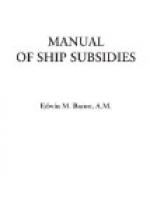Meanwhile complaints of the Admiralty’s partiality in the allotment of the contracts had been renewed more vigorously, with wider criticism of grants for mail carriage largely in excess of the postage received; and in 1859-60 another Parliamentary investigation was made. The ultimate result of this inquiry was a radical change in the system. The management of the ocean mail-service was taken from the Admiralty and placed wholly in the hands of the Post-Office Department; and at the expiration of the Cunard Company’s extended contract, the service was thrown open to public competition, as the Parliamentary committee of 1846 had advised.
Bids were now received from the Cunard, the Inman, the North German Lloyd, and other lines. The Inman Company had previously offered to perform the service, and had done so for sea-postage only.[AQ] Contracts were finally concluded with the three named. The contract with the Inman Line was for a fortnightly Halifax service, for seven hundred and fifty pounds the round trip, nineteen thousand five hundred pounds a year, and a weekly New York service for sea-postage. That with the Cunard Line was for a weekly service to New York at a fixed subsidy of eighty thousand pounds. That with the North German Lloyd was for a weekly service, at the sea-postage. These contracts were to run for a year only. The Cunard’s subsidy, although considerably less than half the amount that the company had received the previous ten years, showed a loss to the Government, at sea-postage rates, of forty-four thousand one hundred and ninety-six pounds, since the amount actually earned at sea-postage rates was twenty-eight thousand six hundred and eighty-six pounds.[AR]
When advertisements for tenders were next issued, it was found that the Cunard and Inman companies had formed a “community of interests,” with an agreement not to underbid each other. They asked a ten years’ contract on the basis of fifty thousand pounds fixed subsidy for a weekly service. Instead, they were awarded seven years’ contracts: the Cunard for a semi-weekly service, seventy thousand pounds subsidy; the Inman, for a weekly service, thirty-five thousand pounds subsidy.[AR] At the same time contracts were made with the North German Lloyd and the Hamburg-American lines for a weekly service for the sea-postage.
The Cunard and Inman grants were sharply criticised, and a Parliamentary committee was appointed to investigate them. The committee’s report sustained the critics. It observed that “the payments to be made when compared with those made by the American Post Office for the homeward mails are widely different, inasmuch as the American Post Office has hitherto paid only for actual services rendered at about half the rate of the British Post Office when paying by the quantity of letters carried.” The committee recommended that these contracts be disapproved, and that the system of fixed subsidies be abolished. “Under all circumstances,” they concluded, “we are of the opinion that, considering the already large and continually increasing means of communication with the United States, there is no longer any necessity for fixed subsidies for a term of years in the case of this service."[AS] This recommendation, however, was not accepted, and the contracts were duly ratified.




